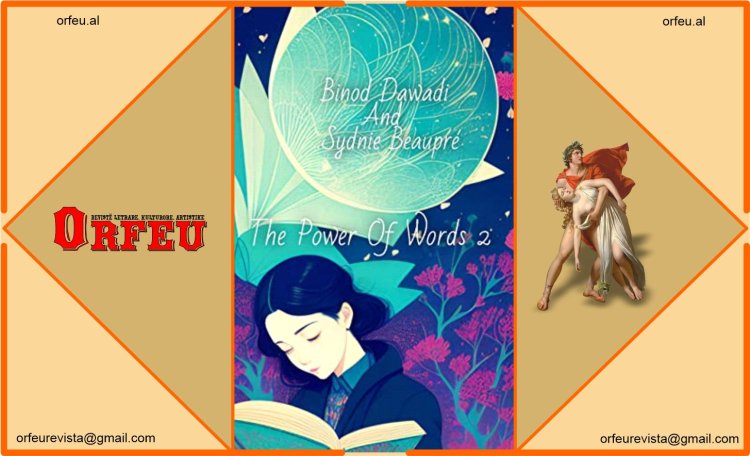Varied Expressions
The Power of Words 2 Book Review
The Power of Words 2 written and edited by Binod Dawadi from Kathmandu, Nepal and Sydnie Beaupre from Canada respectively begins with simple and minimalistic outlook to life. We have poems written by Binod with uncapitalized titles and poems by Sydnie have capitalized titles. The book also contains fictions written by Binod and Sydnie separately.
The poet puts forth that he is happy without luxury—this is a minimalistic idea. The poems are simple and they flow spontaneously. I see wisdom and honesty in the self-expression of both the writers of this collection. A belief in higher power like Jesus and Buddha have been turned into a common need for enlightenment and humanity. The existence and belief of gods in human form have been celebrated.
The birth of many Gods like Jesus Christ,
Gautam Buddha and the like help to spread,
Enlightenment. (Context)
There is a reference to Kubla Khan, a literary work by Samuel Taylor Coleridge in one of the poems written by Binod. This reference to notable literary work provides an authentic intellectual attire to this collection. The ability of Binod to relate to these literatures of past is worthy to be noted. There is a poem titled "Oneirism" which means dream like experiences. This poem has that personal touch and it has been expressed well. It has proven that poetry is the highest form of human expression.
In one of the poems Binod evokes beauty by taking the name of Helen. A good vocabulary like oneirism, literary references and new ideas make this collection fresh. The poet values knowledge according to the written poems, but we feel that he is also imparting knowledge and sharing his wonderful insights to us. They come with graspable meanings and enlighten us. Gatsby, Romeo and Juliet as lovers, Romance in Titanic and Hamlet are also recalled.
Knowledge is God and God is knowledge. (Fiction)
The above-mentioned line shows how the poet values knowledge above all. How poet Binod defines fiction is also important to understand his art. This poem titled "Fiction" has defined his idea of imagination and fiction. Imagination is valued at last, which is the tool of worship for all the poets and writers. The poems in this collection make us understand the need for knowledge and also the importance of imagination.
But also if people get knowledge and gain
Awareness from my imagination,
I should imagine and use fiction. (Fiction)
The poems in this collection also represent grimness of the mind. The not-so-bright side of the mind is also represented. The psychological confession is a daring thing to do. We live in a rapidly growing modern materialistic world where mind is not valued among richness and high goals. However, poet Binod turns inward and addresses his mind. Poetry can be a healing touch of representation if we dare to be self-critical. Inner consciousness and mental well-being are an honest representation, which should not be mistaken for mere confession. The poet is trying to open up himself for us. Poetry will keep that bold voice undying.
In the poem titled "The Power of Dream" many great personalities are mentioned. They are the ones who became successful by overcoming their weakness. Some were born differently-abled. There are names like Jennifer Bricker (an American gymnast born without legs), Stephen Hawking, Albert Einstein, S.T. Coleridge, Sigmund Freud, William Shakespeare, Martin Luther King, William Blake (who composed the famous poem Sick Rose; it is mentioned in the poem "The Power of Dream" written by Binod), Newton and the Wright Brothers.
How Binod provides the message in this poem by connecting with these personalities is really enlightening. The message is uniquely portrayed in his expression. The message is also varied, effective and well communicated.
The poem entitled "Right To Live" has a humanitarian tone. It talks about equality of rights.
The reference to a famous poem by Robert Frost titled "Stopping by Woods on a Snowy Evening" is exceptional in this book because it has been linked to horse and its fidelity that never deceives. The idea that horse is not infidel to its master is put forth in this poem. Trojan Horse is also remembered.
In Stopping by Woods on a Evening
Robert Frost forgets times and enjoys,
Nature. but his horse shakes a bell,
Showing the delay of time and telling reader that they went very far (Infidelity)
The poems in this book feel too direct, but they convey their ideas in a simpler way. Young readers will also find this book understandable. They can get acquainted with literary and important references in the book. The references in the book are varied and important. They create impressions on the readers' mind and cannot be forgotten.
The story about essence warriors entitled "Victorious" is a varied and culturally diverse fiction. It is written by Sydnie Beaupre. Magic and good and bad vampire also make up the fiction section. Binod has written about good and bad vampire. In the story Binod is a good and kind Vampire. It carries a moral message. Good vampire is aware about the evils of the society. He wants to contribute to the goodwill of the society. A good Vampire can be a modern-day character.
In the fiction part of the book, the link between Binod's good vampire and Sydnie's Japanese yokai (not all yokai are evil) have similarity. The fight between spirit and human, some yokai preventing a spirit from attacking a human all build up great interest in the fiction section of this book. The first story of the fiction section written by Sydnie is captivating. It is also unique. This story has a charm of a true literary creativity. The coherence, character development and what the characters do are properly portrayed in the first story entitled "VICTORIOUS" by Sydnie Beaupre.
The second story in the collection by Sydnie concerns familial relationship. It is also equally creative. It offers social insight. The story is titled "Such Broken Beginnings."
Overall, this second book on The Power of Words book series justifies the existence of creativity. I would recommend this book to creative learners and writers. In conclusion, this collection is an insightful use of time from the perspective of both, the writer and readers.
Bio of Sushant Thapa
Sushant Thapa (born on 26th February, 1993) is a Nepalese poet from Biratnagar-13, Nepal who holds a Master’s degree in English literature from Jawaharlal Nehru University, New Delhi, India.
He has published five books of English poetry namely: The Poetic Burden and Other Poems (Authorspress, New Delhi, 2020), Abstraction and Other Poems (Impspired, UK, 2021), Minutes of Merit (Haoajan, Kolkata, 2021), and Love’s Cradle (World Inkers Printing and Publishing, New York, USA and Senegal, Africa, 2023), Spontaneity: A New Name of Rhyme (Ambar Publication, New Delhi, 2023).
Poems written by Sushant has been published in places like Sahitto Bilingual Magazine, Sahitya Post, The Gorkha Times, The Kathmandu Post (Print), The Poet Magazine, The Piker Press, Trouville Review, Lothlorien Poetry Journal, Impspired, Harbinger Asylum, New York Parrot, Pratik Magazine edited by Himalayan Poet Yuyutsu Sharma (Print), The Beatnik Cowboy, The Dope Fiend Daily, Atunis Poetry, EKL Review, The Kolkata Arts, Dissident Voice, Journal of Expressive Writing, Sindh Courier, Bharath Vision, As It Ought To Be Magazine, Spillwords, Mad Swirl, Ink Pantry, International Times, Roi Fainéant Press, Medusa’s Kitchen, Outlook India, Prodigy Magazine, Bold Monkey Review, Argotist Online Poetry among many.
Amazon link



